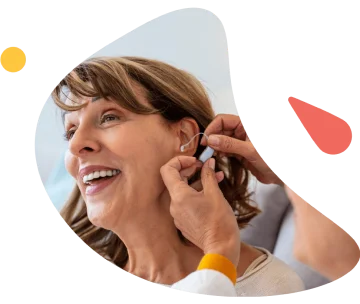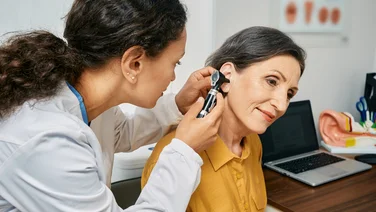Congenital hearing loss is a hearing impairment that’s present from birth. It can be unilateral, meaning it affects one ear, or bilateral, meaning there is hearing loss in both ears.
If your child is born with hearing loss, it may be described as mild, moderate, severe, or profound, depending on how much or little they are able to hear.
According to the Centers for Disease Control and Prevention (CDC), between one and two babies in every 1,000 born in 2019 had hearing loss.
Causes of congenital hearing loss
There are two main causes or types of congenital hearing loss: genetic and non-genetic. You might see these also called hereditary and non-hereditary, respectively.
Genetic hearing loss accounts for around half of the congenital hearing loss cases. In around one-quarter of cases, a baby’s hearing loss is caused by problems during pregnancy – the mother having an infection, for example – or complications during or after birth.
In some cases, your healthcare professional may not find a cause for your baby’s hearing loss.

Genetic causes
If your baby has a genetic hearing loss, it means they inherited it from their biological parents. They can either inherit a faulty or changed gene from one parent, or from both parents.
Very rarely, genetic changes aren’t passed down from parents but occur randomly before birth.
Syndromic hearing loss
Sometimes, congenital hearing loss with a genetic cause forms part of a wider collection of associated symptoms or conditions. This is called a syndrome, and the hearing loss is described as ‘syndromic’.
There are more than 400 syndromes that researchers know about that have hearing loss as a symptom. These syndromes can also cause problems with other parts of the body, like the heart, eyes, and kidneys.
It’s thought that around one-third of babies born with genetic hearing loss have a syndrome.
Some common syndromes include:
- Down syndrome
- Usher syndrome
- Treacher Collins syndrome
- Waardenburg syndrome
- Alport syndrome
- Pendred syndrome
- Turner syndrome
Non-syndromic hearing loss
If a genetic cause of your baby’s hearing loss is identified, but there are no other symptoms, it’s called ‘non-syndromic’, because the hearing loss doesn’t form part of a syndrome.
Around two-thirds of cases of genetic congenital hearing loss are non-syndromic.
The National Center on Birth Defects and Developmental Disabilities, which is part of the CDC, has produced a booklet explaining how genetics play a role in hearing loss in children.
Non-genetic causes
Many cases of congenital hearing loss are not genetic in origin.
- The mother has a health condition during pregnancy, such as diabetes, or high blood pressure
- Rhesus (Rh) incompatibility or Rhesus disease, where the mother produces certain antibodies that attack the baby’s blood
- The mother uses alcohol or drugs while pregnant
- The baby develops an infection in the womb, like rubella or the herpes simplex virus
- The baby is born prematurely or at a low birth weight
- The baby doesn’t get enough oxygen in the womb or during delivery
- The baby is injured or sustains trauma during birth
- The cochlea doesn’t form properly, which is known as Mondini malformation
- Another part of the inner ear, the vestibular aqueducts, is malformed. This is known as enlarged vestibular aqueduct syndrome
Signs of hearing loss in babies
If your baby has congenital hearing loss, they will probably show signs early on – even soon after birth.
For example, babies with standard hearing will react to loud noises. They might suddenly wake up or appear startled at the noise. If your baby has hearing loss at birth, they might not react at all.
Other signs might become apparent as they get older. By the time they reach six months old, a baby with normal hearing will turn their head in the direction of a sound.
A baby with hearing loss might turn when they see you, but not in response to sound.
Their speech development will likely be affected. For example, while typical one year olds will start producing single words, an infant with hearing loss might not be forming speech words by their first birthday, or beyond.
Children will display additional signs as they grow, but if their hearing loss is congenital it will usually be picked up when your baby is screened for hearing loss.
If your child is struggling with their hearing…
It is worth speaking to a professional
How is congenital hearing loss diagnosed?
Around 98% of newborn babies are screened for hearing loss when they’re born, most commonly before they leave the hospital.

Newborn screening usually comprises two simple, pain-free tests that can be performed while they’re asleep. They are:
- Otoacoustic emission (OAE) test – this examines how well the inner ear, or cochlear, works.
- Auditory brainstem response (ABR) test – this looks at the inner ear and examines how sound messages are sent to, and interpreted by, the brain.
If your baby doesn’t pass their newborn hearing screening, it doesn’t necessarily mean they have hearing loss.
To confirm whether they have a hearing impairment, it’s important they have more in-depth tests with an audiologist as soon as possible – before they are three months old.
Treating congenital hearing loss
If your baby is diagnosed with hearing loss, they should have access to an intervention by the time they reach six months old.
There is no cure for congenital hearing loss, but it can be treated and managed.
In most cases, hearing aids are recommended, but if your baby’s hearing loss is very severe or profound, they might need a cochlear implant.
They may also benefit from speech and language therapy and other types of therapies to help them learn key skills, like social skills.
Early diagnosis of congenital hearing loss and timely access to appropriate services can greatly improve your child’s speech and language development, as well as social skills.Don’t forget, if you start to notice your child struggling with hearing, or spot their hearing gradually getting worse, it’s always worth speaking to a professional. We can connect you with a local audiologist to get you and your family the help you need. Fill in our quick form and we’ll do the rest.








